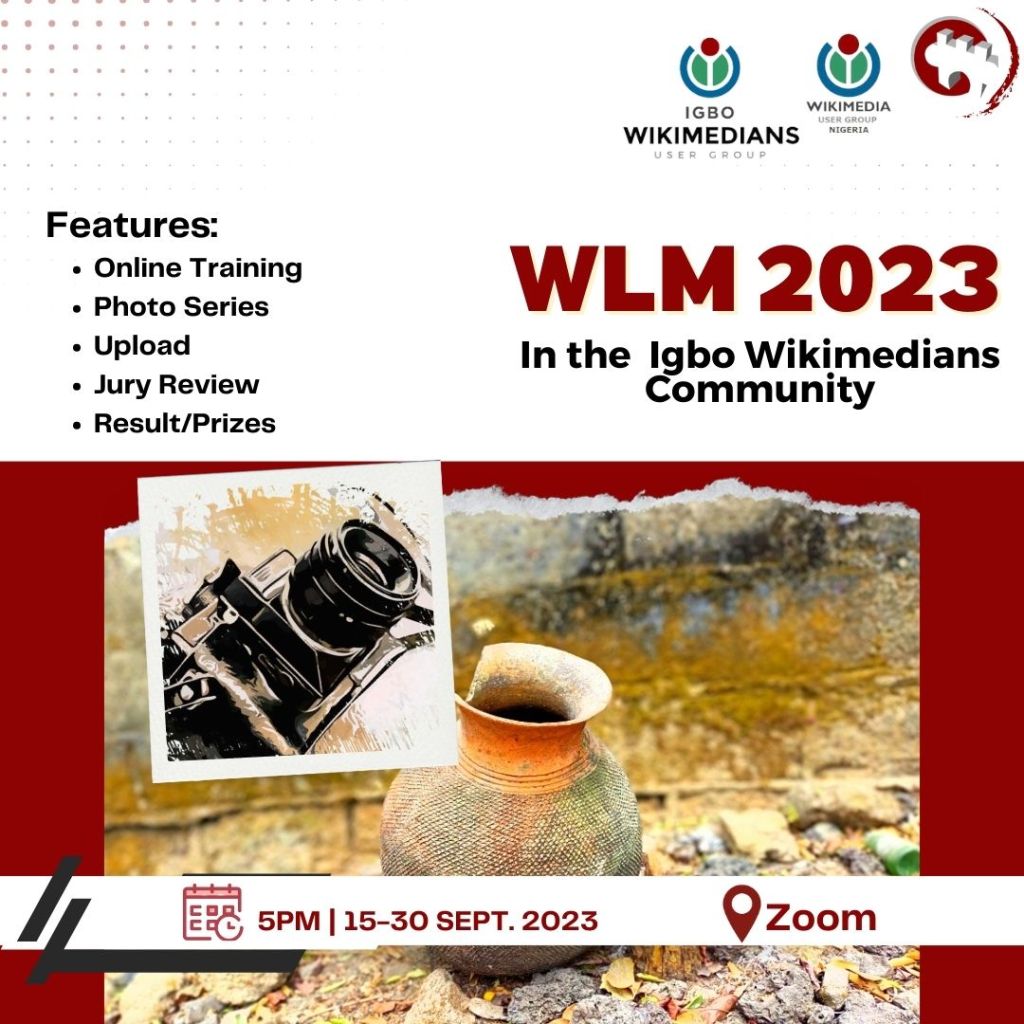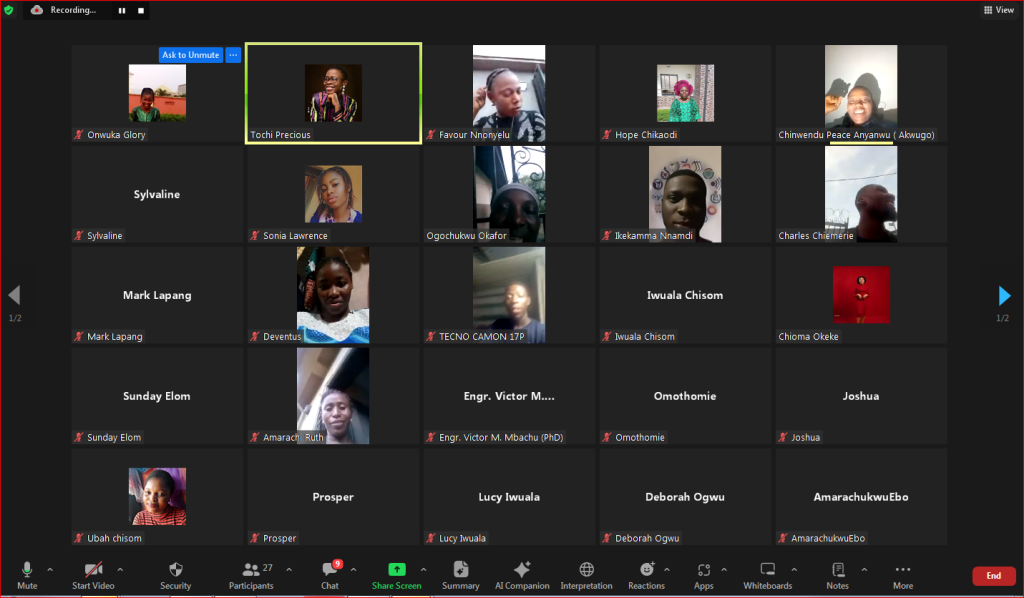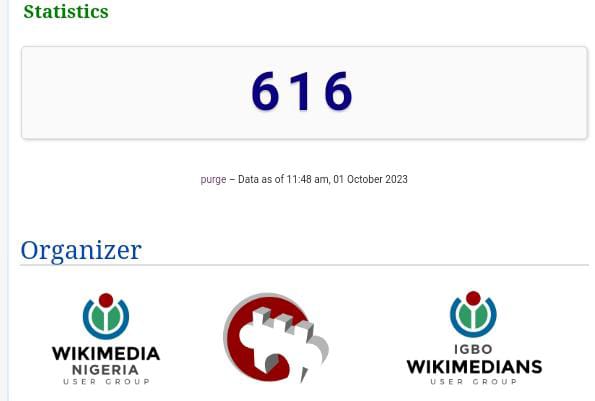Wiki Loves Monuments in a Bit
Wiki Loves Monuments is an annual international photographic competition usually held between September to October, and organized in a federated system globally by Wikimedia community members with the help of local Wikimedia affiliates across the world. Its activities involves participants taking pictures of local historical monuments and heritage sites in their region, and uploading them to Wikimedia Commons with the sole aim of highlighting the heritage sites of their countries so as to encourage individuals to capture pictures of these monuments, and to put them under a free licence which can then be re-used by anyone, anywhere – including on the Wikimedia projects.
The Igbo Wikimedians User Group Debut into WLM Campaign
For the first time, the Igbo Wikimedians Community took part in the global campaign of Wiki Loves Monuments which as a passionate advocate for the preservation of cultural heritage, I had the privilege to coordinate and the experience was nothing short of inspiring. From sharing and getting the approval of the IWUG stakeholders to engaging with the community, to witnessing the creativity and dedication of participants, the campaign was a true celebration of our historical landmarks and the power of collaborative documentation – officially ushering the Igbo Wikimedians User Group into the world of the historical sites documentation through the Wiki Loves Monuments Campaign.
Planning/Implementation – Stating the Objective and Guidelines
To ensure proper and smooth implementation of the campaign, the already existing WLM Philosophy and objectives of the campaign were clearly stated and captured on the Campaign Meta Page which includes to document the Igbo monuments & historic sites for posterity, raising awareness of its rich cultural heritage, expansion of Wikipedia and Wikimedia Commons contents, and enlightening the public on the need to preserve and share the stories behind their historical sites. Upon obtaining the approval and sponsorship of the IWUG and consulting/obtaining the consents of the National Organizers of Wiki Loves Monuments in Nigeria, the first step was to assemble a dedicated team of jury volunteers led by Ceslause, each bringing their unique expertise to the table. We adhered closely with the already curated list of declared monuments in Nigeria and also outlined the scope of what is considered as Monuments by the national organizers, ensuring that the campaign was conducted with respect for the historical sites and relevant regulations. With our permissions secured, we launched a targeted promotional campaign by creating eye-catching flyers, social media publicity and engaged with User Group’s communication handles to spread the word. The response was overwhelmingly positive, with a surge of interest and enthusiasm from people who shared our passion for heritage preservation
The Launch/Timeline
15th September, 2023 saw the official launch of Wiki Loves Monuments 2023 in the Igbo Wikimedians Community which was carried out online and attended by over 25 participants. We organized online training sessions to equip participants with the skills needed to capture the essence of our monuments through photography. The level of enthusiasm and willingness to learn was truly heartening, and it was clear that the participants were deeply invested in the project. During this session, important/vital information was explicitly shared to ensure a smooth and active participation of the participants. It included a Q&A session that offered the members of the community the space to ask questions and get clarification where they seem not to understand. It also encompasses a practical session so as to ensure that even the newbies were carried along – this session was recorded for future reference. With a clear focus on outlining the rules and guidelines of the contest and the criteria to be adhered to, the campaign was officially declared open and span through till the 30th September, 2023 with a total of 42 participants successfully registered on the Campaign Dashboard and 616 uploads captured on the statistics funnel at the end. One of the most rewarding aspects of the campaign was the hands-on engagement with the community.
Prizes/Awards
As the submissions poured in, we were consistently impressed by the stunning photographs that captured the historical sites in all their glory. The sense of pride and appreciation for our cultural heritage was palpable in every image, and it was incredibly gratifying to see the community come together to contribute to the preservation of our history. The culminating event was the nomination of the best photographs for the IWUG Special Prize Category and this prize ran across the 1st – 10th position. However, at the end of the jury processes, only the Top 5 were eligible for the IWUG Special Prize Category. Each participants received the prize equivalent as Gift Vouchers. The level of creativity and artistry displayed in the submissions was nothing short of breathtaking, and it was a joy to see the participants’ hard work acknowledged and appreciated. Notwithstanding, they are also eligible for the International Prizes and National Prizes.
Challenges
Indeed, it is quite understandable to experience some hurdles and challenges in the implementation of any given project, and as first timers in the WLM Project, we also had our share of the challenges which include but not limited to difficulty in project definition, newbies challenges, lack of technical know-how, unrelated photo uploads, etc.
- In terms of project definition, we experienced the challenges of explaining to the participants the scope of ‘monuments’. Some of the participants seem not to fully understand what we meant by ‘monuments’ and as such limited their uploads to just moulded monuments, but we were able to resolve this issue by curating a list of what we define as ‘monuments’ and they were able to understand and explore more.
- We had the challenge of starting all over to teach newbies how to upload on the Wikimedia Commons as some of them joined the Wiki Community at the period of the contest.
- The lack of technical know-how was also one of the challenges we encountered as some of them seem to forget to add the right categories that would help channel their uploads to the stipulated category funnel – we resolved this typing out the category separately and always added it to all of our publication for easy access.
- The upload of unrelated content was also another challenge as some of the participants who just joined without reading through the guidelines were uploading unrelated contents – we were able to checkmate all these by reaching out privately to these participants and sharing the guidelines with them.
- All these and many more are what sum up some of the challenges we encountered on this journey, but we were happy to surmount them all as it challenges us to strive for better results.
Conclusion
In the end, the results spoke for themselves. We were able to significantly expand and document the content related to our monuments on Wikipedia and Wikimedia Commons, and the campaign succeeded in fostering a deeper understanding and appreciation for our cultural heritage within the community. The success of the Wiki Loves Monuments campaign in the Igbo Wikimedians Community is a testament to the power of community engagement and collaboration in preserving and celebrating our history. The experience has left an indelible mark on all involved, and I am incredibly grateful to have been a part of such a meaningful initiative. I look forward to building on this success and continuing to champion the preservation of our cultural heritage in the future. Reminiscing over the period of the project timeline and seeing the results amassed, I am really grateful to the Stakeholders of Igbo Wikimedians User Group and especially the Programme Director, Tochiprecious for always creating a space to give a listening ear to new ideas and the strong support.
Indeed, documenting our cultural heritage is a collective effort!

Can you help us translate this article?
In order for this article to reach as many people as possible we would like your help. Can you translate this article to get the message out?
Start translation


